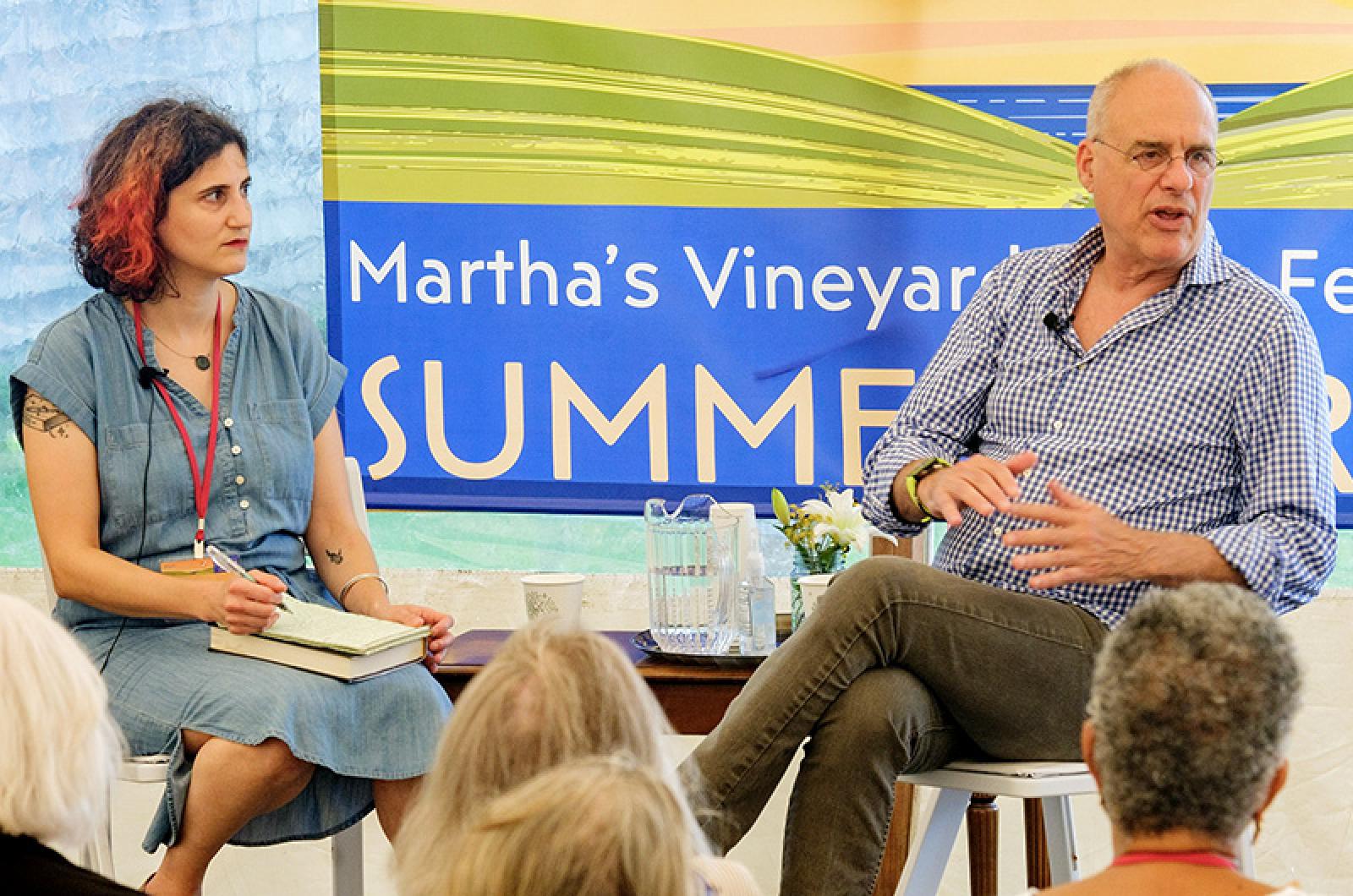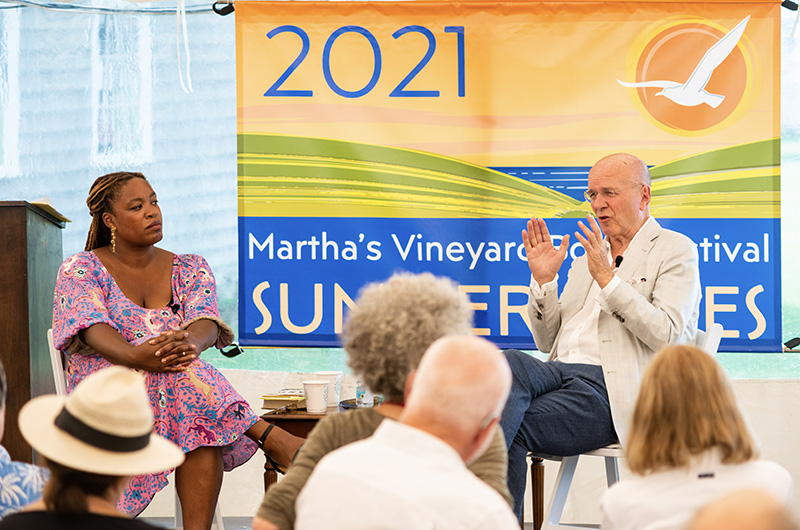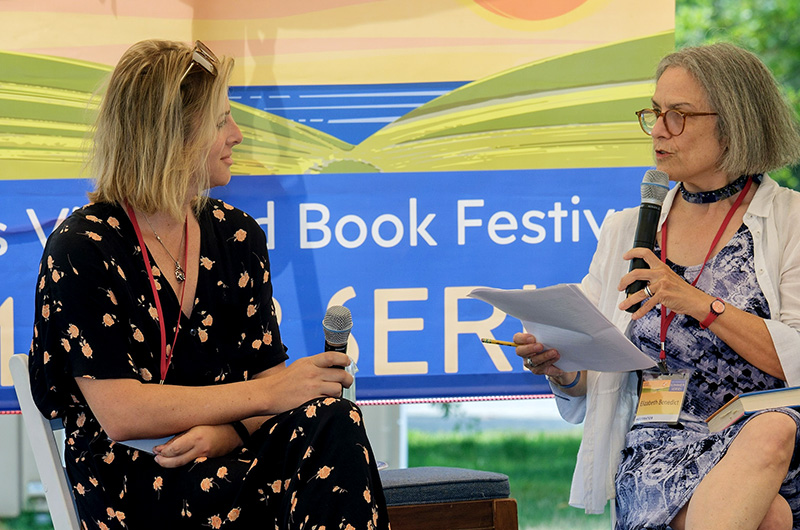For four days in two locations, 22 of the country’s leading authors and thinkers gathered for the biennial Martha’s Vineyard Book Festival to talk about their books and engage in panel discussions. The topics ranged from racism and gene editing to climate change, short story writing and the history of home economics.
After more than a year in which the pandemic forced most events to go virtual, the hybrid festival reignited the magic of readers and writers meeting in person and online for a full schedule of festivities.
“The opportunity to be able to sit together in the same room with these authors, or the same tent with these authors . . . there is a chemistry, there’s something that happens when we’re together,” said Suellen Lazarus, founder and director of the festival.
The event began on Thursday evening at the Martha’s Vineyard Museum with a conversation between Nobel Laureate Daniel Kahneman and best-selling author Walter Isaacson. Friday’s programming also took place at the museum. Panels over the two days at the museum included conversations about mothers and daughters, the country’s history of racism and exclusion, and the future of journalism.
On Saturday and Sunday the location shifted to the Chilmark Community Center. The addition of live streaming, Ms. Lazarus noted, allowed more people to attend the festival from across the country and the world.
Author talks were center stage over the weekend with Mr. Isaacson, Mark Bittman, Elizabeth Kolbert, Cecilia Kang and Torrey Peters giving presentations on Saturday.
Ms. Peters discussed her debut novel, Detransition, Baby, with novelist and journalist Elizabeth Benedict. The conversation examined the realities of trans womanhood, with Ms. Peters sharing how her own gender identity informed her fiction.
“Writing and transition for me were very closely intertwined,” she said.
Ms. Kang, a New York Times technology reporter, spoke with fellow festival author and New Yorker staff writer Andrew Marantz about her book An Ugly Truth: Inside Facebook’s Battle for Domination. The authors focused on the dark underbelly of the social media giant and pondered its potentially catastrophic effect on democracy and personal privacy.
“Thank you for not biking or swimming and coming to talk about very depressing things with us,” Mr. Marantz joked with the crowd at the talk’s outset.
On Sunday, authors and readers returned to dig into stories about black life, history, land, politics and culture. A common theme under one tent was the similarity between the current political moment and the Gilded Age of the late 19th century. Sen. Amy Klobuchar and author Heather McGhee analyzed these parallel moments of rampant inequality.
Due to ongoing debate in Washington over the weekend on the infrastructure bill, Senator Klobuchar had to join the festival remotely. Her new book is called Antitrust: Taking on Monopoly Power from the Gilded Age to the Digital Age.
Senator Klobuchar connected the growth of technology monopolies and the increasingly precarious future of independent news outlets.
“If we don’t do something to make it easier for news organizations to continue to give us the content that’s real news, we’re going to have nothing left but Facebook’s newsfeed,” she said.
Ms. McGhee’s new book is called The Sum of Us: What Racism Costs Everyone and How We Can Prosper Together. She was joined on stage by Bliss Broyard. Much of the discussion centered on the use of negative stereotypes that are still used to justify inequalities today.
“It’s useful to divide us up,” Ms. McGhee said. “It’s useful to have us not have empathy and solidarity for one another.”
The festival concluded with a look to the future. Authors Danielle Dreilinger, John Judis, Louis Menand, Simon Winchester and Brandon Taylor offered thoughts.
“I feel like someone’s hazing me a little bit with this session,” said Tyson Evans, panel moderator and senior editor and director of strategy at the New York Times. “It feels slightly impossible to try to stitch together this incredible array of authors and all the topics that we’ve heard about. Over the last few days, I’ve been lucky to sit in so many sessions, from the future of humankind and gene editing, to the future of politics, to the future of the planet, to the future of literally . . . everything.”
One constant was a sense of optimism.
“I tend to have hope for the future maybe because I’m a cockeyed optimist,” Ms. Dreilinger said. “Maybe because civil rights leaders were shot at and they still had optimism, maybe because I get to interview 12 year olds a lot.”
For Ms. Lazarus part of the joy of the festival is bringing so many writers together in one place.
“The authors making connections among themselves is always a terrific thing,” she said.
She also gave high praise to all the workers and volunteers who kept the operation running smoothly, checking in guests, ushering cars into parking spots and cleaning tents between talks. Ms. Lazarus expressed her gratitude for the work.
“You’re sitting inside writing emails when everyone is going to the beach,” she noted. “But it feels like it’s a service, and I’m so appreciative of the people who work on it.”











Comments
Comment policy »